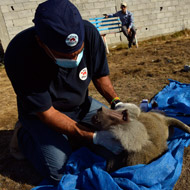
FOUR PAWS are helping the surviving animals of Al-Bisan Zoo in the North of the Gaza Strip
An emergency team from the international animal charity FOUR PAWS is helping the surviving animals of Al-Bisan Zoo in the North of the Gaza Strip by providing urgently needed medical treatment.
More than 80 animals died when the zoo was severely damaged by airstrikes during the ongoing conflict in the Gaza Strip. A FOUR PAWS emergency team, led by Dr Amir Khalil and local supporters, are now providing help to the 20 surviving animals.
Because FOUR PAWS is well connected in the region, zoo manager Shady Hamad officially asked the organisation for help because the surviving animals had been left without water or food.
Very concerned about the state of the zoo, Dr. Amir Khalil said: "Most of the enclosures have been severely damaged. There are several dead animals lying around the enclosures. The few surviving animals, among them three lions, are traumatised, ill and very weak."
Equipped with antibiotics, worming medicine and disinfectants, the emergency team is now administering medical treatment on site. Food deliveries have been arranged from Gaza and the team is also restoring the water supply by repairing pipes. As the lions enclosure was damaged, the team are first focusing on making the enclosure secure and undertaking security measures.
The Sinai Peninsula and the border area between Egypt and Israel, suffer frequent terrorist attacks. Dr Khalil said: "We had to plan the operation from Cairo, working with the Egyptian authorities and local NGOs. The team's safety was our top priority. We were finally able to reach the Gaza Strip accompanied by military convoy."
It is not yet clear if the zoo will be able to carry on. Dr. Khalil added: "We will now assess whether the lions can be transferred to a safe place outside Gaza as well as finding a solution for the other remaining animals." FOUR PAWS say that this is likely to be decided in the next few days.
Image © FOUR PAWS



 The Animal and Plant Health Agency (APHA) has updated its online reporting service for dead wild birds.
The Animal and Plant Health Agency (APHA) has updated its online reporting service for dead wild birds.